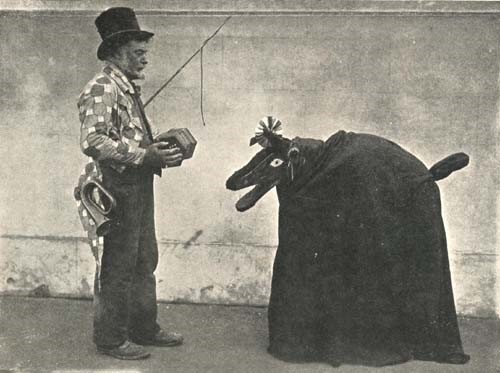Hoodening, also called Hodening, is an East Kent, England tradition vaguely related to Mumming and the Morris dance, and dating back at least to the mid-18th century. Related traditions also exist in Wales and Lancashire. It was centred on the ploughing teams at farms in and around Thanet, although groups also existed in Deal which were more related to the men-at-sea, and who concentrated on performing music. The common feature to all groups was the appearance of a Hooden Horse – a wooden horse’s head mounted on a pole, with a sackcloth attached to hide the bearer. The head would normally have a hinged jaw which could snap shut with a mighty crack. The groups would tour the area in the period leading up to Christmas, engaging in tomfoolery at local landowners’ houses and requesting ‘largesse’, i.e. funds to tide them over the slack period of the year. Despite occasional breaks, the tradition is a living one, and is currently performed by several teams around East Kent. The money raised is now normally given to charity. A slightly modified version still takes place in Newfoundland, Canada. The main differences being that it is now just a social festivity in which the Mummers get dressed up and visit the elderly, dancing about the house and acting foolish.

Our own Richard Maylam is proud to say that he is the great-nephew of Percy Maylam, the Canterbury antiquarian who carried out extensive research on the hoodening tradition whilst being a member of the Kent Archaeological Society. Fearing the tradition would die out, ‘Great Uncle Percy’ published a book of his findings in 1909. To commemorate the centenary of this work, Richard and two of his ‘hoodener’ friends, Mick Lynn and Geoff Doel, organised for the book to be reprinted in 2009, in order to raise its profile once again. They sincerely hope that the tradition of hoodening will be recognised by UNESCO as part of its Intangible Cultural Heritage list.
Read more here: Hoodening – Wikipedia
Wonderful video and detailed history here: Hoodening

You must be logged in to post a comment.